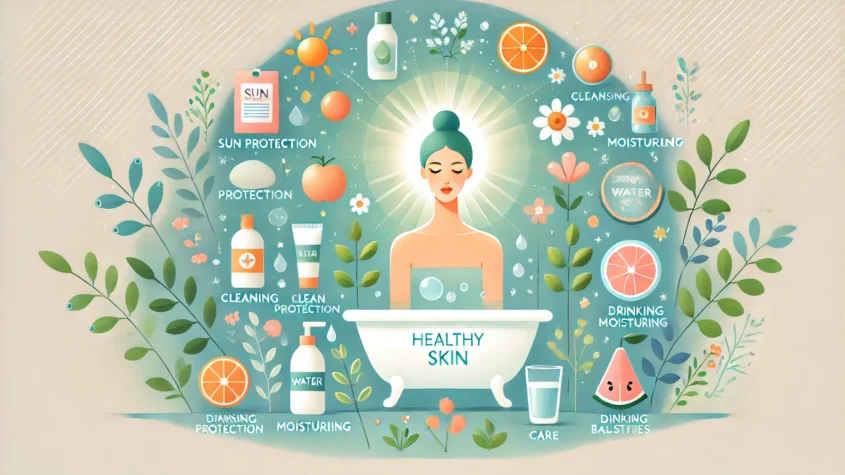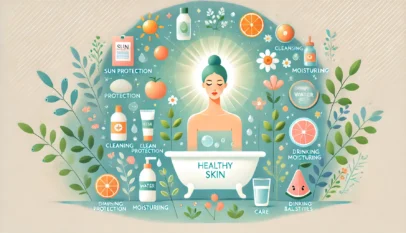
Skin care is an essential part of maintaining healthy and radiant skin. With the abundance of products and practices available, finding the right routine can be overwhelming. A well-structured skin care routine tailored to individual needs can significantly improve skin health and appearance.
In recent years, the trend of using organic and natural ingredients has gained popularity, especially in Hindi-speaking communities. Many are turning to platforms like Wellhealthorganic to discover effective home remedies and professional advice. These resources empower individuals to make informed choices about their skin care.
Understanding the importance of skin care is vital for everyone. Embracing a personalized regimen can lead to healthier skin and increased confidence. By exploring various approaches, readers can uncover the best methods suited to their specific skin types.
Fundamentals of Skin Care
Effective skin care relies on understanding individual skin types, maintaining hydration, and protecting against sun damage. Each aspect contributes significantly to maintaining healthy skin.
Understanding Skin Types
Identifying skin type is crucial for selecting suitable products. There are four primary skin types:
- Normal: Balanced moisture levels, few imperfections, and minimal sensitivity.
- Oily: Characterized by excess sebum, larger pores, and a shiny appearance.
- Dry: Lacks moisture, may feel tight or rough, and can show flakiness.
- Combination: Displays traits of more than one type, often oily in the T-zone and dry elsewhere.
Recognizing one’s skin type helps in choosing targeted treatments. For example, oily skin benefits from lightweight, non-comedogenic products, while dry skin requires richer moisturizers. Regular assessment of skin conditions and changes is important to adapt care routines accordingly.
Importance of Hydration
Hydration is essential for maintaining skin elasticity and avoiding dryness. Skin tends to lose moisture naturally with age and environmental factors.
Incorporating a proper moisturizing routine helps replenish moisture levels. Options include:
- Water-based moisturizers for oily skin.
- Creams and oils for dry skin types.
Drinking adequate water daily also supports internal hydration. Using ingredients like hyaluronic acid can enhance moisture retention. Properly hydrated skin appears plumper and healthier, reducing the risk of premature aging.
The Role of Sun Protection
Sun damage is one of the leading causes of skin aging. Ultraviolet (UV) rays can lead to sunburn, dark spots, and increased skin cancer risk.
The application of a broad-spectrum sunscreen with an SPF of 30 or higher is effective in protecting the skin. Key practices include:
- Reapplying sunscreen every two hours, especially when outdoors.
- Using protective clothing and seeking shade during peak sunlight hours.
Consistent use of sun protection reduces long-term skin damage and maintains an even skin tone. Education about UV exposure remains vital for lifelong skin health.
Skin Care Routine Steps
Establishing a consistent skin care routine is crucial for maintaining healthy skin. The following steps, including cleansing, exfoliation, moisturizing, and nighttime care, can enhance skin quality and appearance.
Cleansing Essentials
Cleansing is the foundation of any skin care routine. It removes dirt, oil, and impurities that accumulate throughout the day. Selecting the right cleanser is key.
- For Oily Skin: Use a gel-based or foaming cleanser to control excess oil.
- For Dry Skin: Cream-based cleansers provide hydration and prevent stripping natural oils.
- For Sensitive Skin: Opt for fragrance-free, sulfate-free products to minimize irritation.
Apply cleanser gently using circular motions, and rinse with lukewarm water. This helps maintain skin’s natural moisture balance.
Exfoliation Techniques
Exfoliating regularly promotes cell turnover and improves skin texture. It can be done through physical and chemical methods.
- Physical Exfoliation: Use scrubs with fine grains or tools like brushes. This method should be done 1-2 times a week, especially for oily skin.
- Chemical Exfoliation: Products containing AHAs or BHAs work effectively to dissolve dead skin cells. For sensitive skin, choose milder formulations.
Be cautious not to over-exfoliate, as this may lead to irritation and sensitivity.
Moisturizing Tips
Moisturizing is essential to keep skin hydrated and maintain its barrier function. Selecting the right moisturizer depends on skin type.
- Gel Formulas: Ideal for oily or combination skin, absorbing quickly without greasiness.
- Creams: Best suited for dry or mature skin, offering rich hydration.
Apply moisturizer immediately after cleansing or exfoliating to lock in moisture. A lightweight formula can be used during the day, while a heavier one may be suitable for nighttime.
Nighttime Skin Care
Nighttime care focuses on repairing and rejuvenating the skin. This is when the skin undergoes its natural healing process.
- Cleansing: Ensure to remove makeup and dirt accumulated during the day.
- Treatment Products: Consider using serums that target specific concerns, like acne or pigmentation.
Using a nourishing night cream helps in replenishing lost moisture and supports skin recovery. Regular commitment to this routine can lead to visible improvements over time.
Copper Mining Stock: Insights and Trends for Investors
Investors are increasingly looking towards copper mining stocks as a strategic opportunity…










